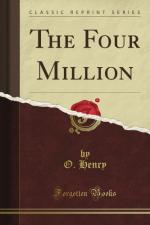Rudolf Steiner was a true adventurer. Few were the evenings on which he did not go forth from his hall bedchamber in search of the unexpected and the egregious. The most interesting thing in life seemed to him to be what might lie just around the next corner. Sometimes his willingness to tempt fate led him into strange paths. Twice he had spent the night in a station-house; again and again he had found himself the dupe of ingenious and mercenary tricksters; his watch and money had been the price of one flattering allurement. But with undiminished ardour he picked up every glove cast before him into the merry lists of adventure.
One evening Rudolf was strolling along a crosstown street in the older central part of the city. Two streams of people filled the sidewalks—the home-hurrying, and that restless contingent that abandons home for the specious welcome of the thousand-candle-power table d’hote.
The young adventurer was of pleasing presence, and moved serenely and watchfully. By daylight he was a salesman in a piano store. He wore his tie drawn through a topaz ring instead of fastened with a stick pin; and once he had written to the editor of a magazine that “Junie’s Love Test” by Miss Libbey, had been the book that had most influenced his life.
During his walk a violent chattering of teeth in a glass case on the sidewalk seemed at first to draw his attention (with a qualm), to a restaurant before which it was set; but a second glance revealed the electric letters of a dentist’s sign high above the next door. A giant negro, fantastically dressed in a red embroidered coat, yellow trousers and a military cap, discreetly distributed cards to those of the passing crowd who consented to take them.
This mode of dentistic advertising was a common sight to Rudolf. Usually he passed the dispenser of the dentist’s cards without reducing his store; but tonight the African slipped one into his hand so deftly that he retained it there smiling a little at the successful feat.




